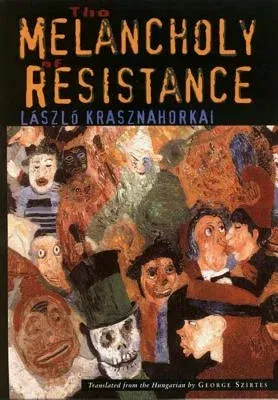László Krasznahorkai
(Author)The Melancholy of ResistancePaperback, 17 June 2002

Qty
1
Turbo
Ships in 2 - 3 days
In Stock
Free Delivery
Cash on Delivery
15 Days
Free Returns
Secure Checkout

Part of Series
New Directions Paperbook
Print Length
320 pages
Language
English
Publisher
New Directions Publishing Corporation
Date Published
17 Jun 2002
ISBN-10
0811215040
ISBN-13
9780811215046
Description
Product Details
Author:
Book Format:
Paperback
Country of Origin:
US
Date Published:
17 June 2002
Dimensions:
19.81 x
13.77 x
2.13 cm
ISBN-10:
0811215040
ISBN-13:
9780811215046
Language:
English
Location:
New York, NY
Pages:
320
Publisher:
Series:
Weight:
326.59 gm